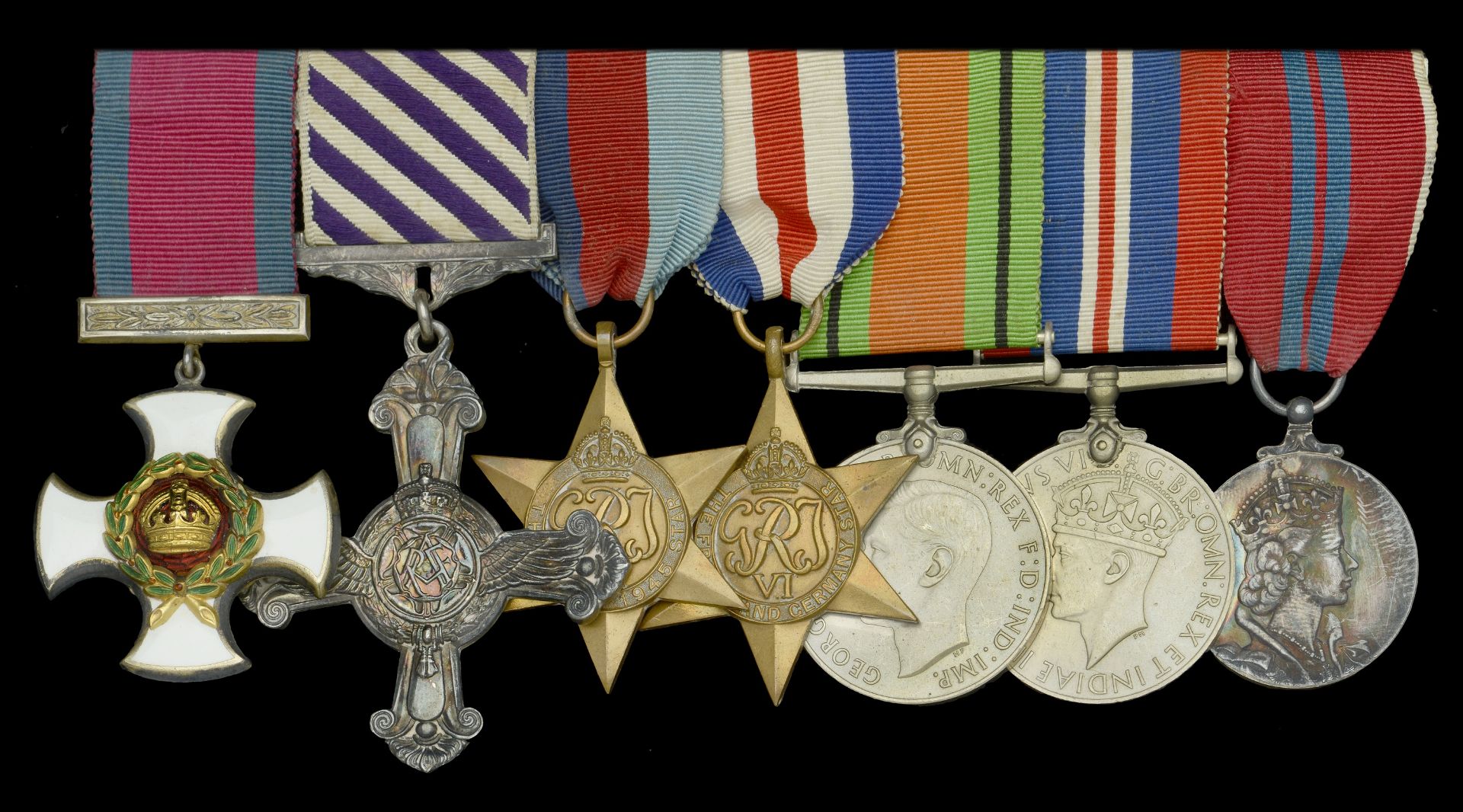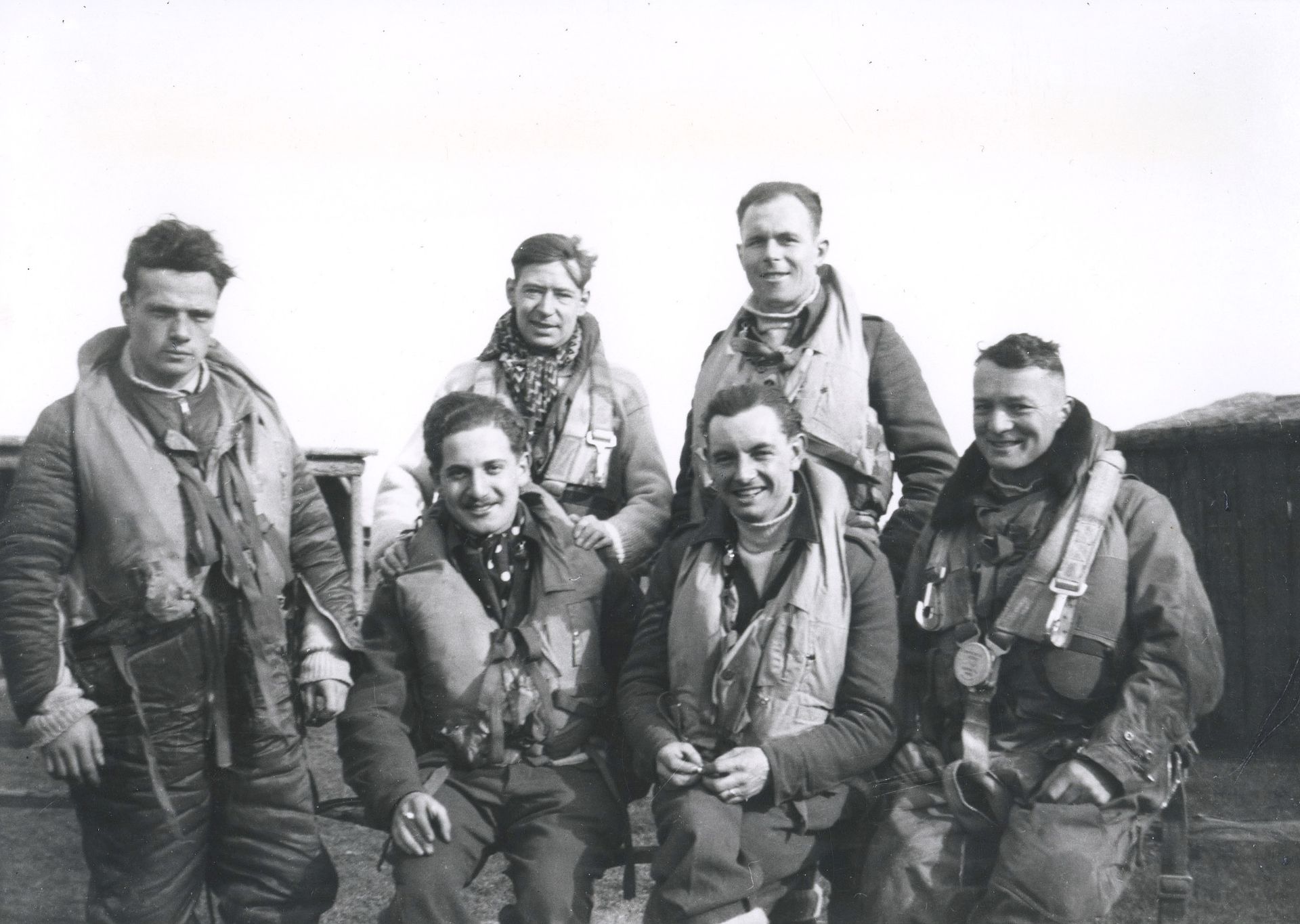A fine Second War 1945 Pathfinder Force Master Bomber’s ‘immediate’ D.S.O., 1944 ‘immediate’ D.F.C. group of seven awarded to Lancaster pilot Squadron Leader G. A. ‘Alex’ Thorne, Royal Air Force, who was additionally recommended for the Second Award Bar to his D.F.C. Thorne flew in at least 54 operational sorties, all but two of which were flown with 635 Squadron - predominantly as a marker crew, but also acting as Deputy Master Bomber on 3 occasions, and ending the war as Master Bomber for 5 operational sorties. After the war Thorne wrote Lancaster At War 4: Pathfinder Squadron in which he chronicled his crew’s service. He was also the founder and club secretary for the Pathfinder Club in Mayfair Distinguished Service Order, G.VI.R., silver-gilt and enamel, reverse officially dated ‘1945’, lacking top riband bar; Distinguished Flying Cross, G.VI.R., reverse officially dated ‘1944’; 1939-45 Star; France and Germany Star; Defence and War Medals 1939-45; Coronation 1953, mounted as originally worn, generally very fine or better (7) £3,000-£4,000 --- D.S.O. London Gazette 15 June 1945: ‘In April, 1945, this officer piloted an aircraft in an attack against Nuremburg. In the run-up to the target, Flight Lieutenant Thorne’s aircraft was subjected to heavy and concentrated fire from the ground defences. The bomber was hit. The port aileron was affected and the aircraft became difficult to control. In spite of this, Flight Lieutenant Thorne made several runs over the target to ensure an accurate attack. He afterwards flew damaged aircraft to base where he effected a safe landing. This officer, who has completed very many sorties since being awarded the Distinguished Flying Cross and never failed to complete his allotted task, displayed the highest standard of devotion to duty throughout.’ The original recommendation (the text of which is incomplete in places) states: ‘On the 11th April, 1945, this officer was detailed to act in the capacity of Master Bomber on the important target at Nuremburg. The attack was carried out in daylight. While running up to the target to mark and assess, this officer’s aircraft received the undivided attention of the heavy flak defences and sustained damage. Disregarding this, he continued on his bombing run and successfully marked. The damage sustained... aircraft affected the aileron control, the port aileron being.... the “up” position. Although his aircraft was very difficult.... this officer, throughout the attack, made a further series of.... the target, many of them at a low altitude, and gave aiming instructions to the Main Force. Having completed his task he then flew his... back and made a successful landing without further damage. This officer has, as Master Bomber, shown outstanding ability... correct and instantaneous decisions in the most arduous circumstances... together with his tenacity, has set the highest example to the... No matter what duty this officer has been assigned to during his career, he has never failed, and his efforts are deserving of... praise.’ D.F.C. London Gazette 5 December 1944. The original recommendation states: ‘This officer was captain of an aircraft detailed to attack a heavily defended German target in daylight on 6th October, 1944. On approaching the enemy coast, trouble developed in the port inner engine, with the result that further height could no be gained, and the aircraft was subjected to heavy and accurate fire from the German ground defences. Although the aircraft was hit many times, this officer, by expert captaincy and complete disregard of the opposition, pressed home his attack with the utmost determination and dropped his bombs accurately and on time. When leaving the target, the aircraft was again hit in the port side, damaging the fuel tanks and causing petrol leaks, which resulted in fire; eventually the fire was put out, but the aircraft being considerably lower than others engaged in the operation, was again subjected to heavy and light anti-aircraft fire. By expert pilotage and cool judgement, F/O. Thorne avoided further damage to his aircraft, but on reaching enemy coast, the aircraft was again hit by heavy flak, resulting in the failure of the port outer engine, and the starboard rudder was also shot away. By skilful handling, under most difficult circumstances, the pilot brought his aircraft back to this country on the two remaining engines and decided to carry out a landing on an emergency airfield. As he was turning towards this airfield, the starboard inner engine failed, leaving only the starboard outer engine serviceable. Height was lost rapidly and F/O. Thorne, realising that he could not reach the airfield safely, made a crash landing in the first available field, without injury to his crew. Throughout this action, this Officer displayed exceptional qualities of leadership and coolness, and his determination and captaincy is deserving of the highest praise.’ The original Recommendation for a D.F.C. Second Award Bar, dated 20 February 1945, states: ‘Since the immediate award of the Distinguished Flying Cross for an outstanding act of gallantry in October, 1944, this officer has completed a further 16 sorties against the enemy, and is now engaged on his second tour of operational duty. As Captain and Pilot he has pressed home his attacks against such heavily defended German targets as Dusseldorf, Stettin and Munich with the utmost determination and vigour, and on several occasions has made a number of runs over his objectives in the face of great odds. Flight Lieutenant Thorne has showed coolness and courage of a high order, and has been a shining example to other members of his Squadron.’ George Alexander Thorne ‘was born at Liverpool on July 25, 1912, and worked in insurance before enlisting in 1940. As a sergeant pilot he was a flying instructor on single-engined aircraft for 18 months. In 1943 he was posted to Cranwell on a comprehensive course which took in navigation, engineering, meteorology and flying twin-engined aircraft. From that intensive experience he graduated to Whitley bombers at Forres, an operational training unit in Scotland. Thorne found himself having to pick a crew from some 100 navigators, wireless operators and bomb-aimers among a group which similarly had been told to find themselves pilots. In his book (the fourth in an Ian Allan series on the Lancaster at War, published last April) he wrote: “It seemed a haphazard way to achieve a vitally important objective, a hit-or-miss gamble with long odds against six strangers coming together in the hope that they would prove compatible in all the qualities - technical and personal - necessary in the make-up of a bomber crew.” As his second navigator he picked Boris Bressloff, a Berkeley Square hairdresser. Posted to a Halifax bomber conversion unit at Rufforth in Yorkshire, the crew became proficient in handling a four-engined bomber. Thorne was commissioned in April 1944 as a pilot officer and encountered the legendary Group Capt. Hamish Mahadie, the former Halton apprentice who was talent-scouting for the Pathfinder Force. Shortly afterwards he was accepted and learned to fly the Lancaster. His next posting was to No. 635, a Pathfinder squadron based at Downham Market, Norfolk, with which he won the DFC and DSO. Although injured on one raid, he soon resumed operations with the squadron...’ (Daily Telegraph Obituary, dated November 1990 refers). The above mentioned publication, Lancaster At War 4: Pathfinder Squadron, was penned by the recipient under the name of Alex Thorne. It offers considerable detail on his own crew’s war experiences, from the forming of th...







